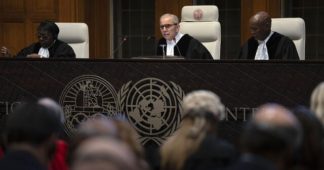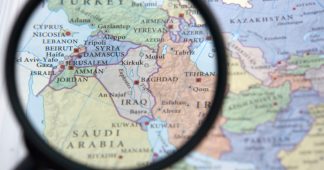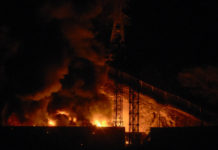By Marwan Emil Toubasi
After its decision to launch a war of genocide against Gaza and before that in Jerusalem and the occupied West Bank, and the expansion of attacks against southern Lebanon and the desire to continue this for ideological and colonial considerations, the position of Israel “the occupying state” in the world is no longer what it was before, to the point that it now stands in the cage of the International Court of Justice and the International Criminal Court. It faces isolation on the one hand, it lacks the terrorist deterrent power that it used to praise. The bloodshed of Gaza, the genocide, and the resulting demonstrations around the world denouncing all of this, all turned Israel into a pariah state in ways that did not exist previously. And here are the numbers in the economy, on the other hand, that indicate that up to 60,000 companies may close their doors in the occupying state this year, in addition to deteriorating economic indicators.
On this front, as on others, American support is no longer useful, but rather causes embarrassment to the White House administration from the American public, especially in the battle of the electoral race and around the world as well.
The current issue goes beyond the ambitions of just one person. Placing all the blame on Netanyahu ignores a deeper problem, which is the gradual erosion in Israel’s strategic thinking over the past fifty years. And here, in particular, major mistakes change. Perhaps the most prominent of them, as many of their thinkers themselves say, is the decision to retain the West Bank and Gaza. They were gradually occupied and colonized as part of a long-term effort to create “Greater Israel” or the “Kingdom of the Jews” and the resulting conflict between the Jewish character of Israel and its “democratic system” that was required to be a model in the region on the part of the West.
Many of these thinkers in particular are concerned because they want a bright future for the occupying state, and they ask questions without answers so far about the reasons for the sharp decline in Israeli strategic thinking and performance. Here lies the bottom line when arrogance leads to the great decline of Israel between two wars. A war in Gaza that it cannot be a victory in it threatens its continuation with the expansion of a regional or even international war, and an internal war that works to erode its capabilities in Israeli strategic thinking and even its nature.
In the midst of all this, the differences are increasing within the various Jewish communities in Israel and what they represent as settler groups that have come to Palestine, and increasing pressure from the families of prisoners in Israel to achieve a breakthrough in the ongoing negotiations, and escalating calls for an immediate halt to the war of extermination from various popular, official and international international bodies, but without issues. Or impose sanctions that lead to this, especially in light of the world’s illusion of the seriousness of the ongoing negotiations to reach an agreement that ends the aggression of the occupying state.
Some sources indicate that there are questions about whether the ongoing negotiations in Doha and later in Cairo actually aim to reach a quick agreement, or whether they aim to buy time and delay the Iranian response and Hezbollah’s response.
There is a possibility that the Israeli and American sides are trying to procrastinate the course of the negotiations to avoid a strike from Iran or Hezbollah, or at least postpone them until a settlement is reached that guarantees their interests. Also, international pressure, especially from the United States and its allies, may be designed to slow down any Iranian or Hezbollah reaction, while a ceasefire and prisoner exchange is being negotiated without adhering to what was previously stated in the Security Council resolution, in particular on which the Hamas movement’s demands for its implementation are based. Considering it a framework for negotiation, the vision becomes clearNetanyahu is about to complete the war of genocide and displacement in Gaza and what is related to it in the West Bank and Jerusalem as well after the end of the first phase of the deal, if it is completed, and this is what was revealed in his agreement document with the terrorist duo Ben Gvir and Smotrich.
I believe that these negotiations are a battle of wills. The Israeli and Palestinian sides, as well as the United States and Iran, are all developing their strategies according to their national and regional interests, which makes these negotiations a testing ground for strength and political and strategic endurance.
On the one hand, Israel and the United States are trying to use negotiations as a tool to delay any major military escalation by Iran and Hezbollah, in light of escalating tensions after the recent assassinations.
This strategy may aim to buy time to prepare the situation diplomatically or at least to better prepare their positions before any potential confrontation.
On the other hand, the resistance, the Palestinian factions, and Iran may see that these negotiations are nothing more than an attempt to weaken their position, prolong the conflict, and achieve more crimes of the occupation in Gaza and its expansion in the West Bank without achieving tangible results. This dynamic creates a situation where each side is trying to impose its will and dictate its terms, reinforcing the sense that negotiations are truly a battle of wills and not simply a diplomatic process.
In the end, these negotiations represent part of the broader struggle for influence and control in the region, as each party seeks to prove its strength and enhance its strategic position in light of the complex and rapidly changing circumstances of the world.
In view of this, there are indications that the United States may be on its way to losing some of its ability to dominate the Middle East. This is due to several complex and overlapping factors,
First, the decline of American influence can be attributed to the shift of American priorities towards the Asia-Pacific region, especially with the growing Chinese influence there. This transformation has left a vacuum in the Middle East that other countries such as Russia, China, and Iran are trying to fill.
Secondly, its repeated failure to achieve permanent stability in the region, whether through wars, mediation attempts, or the mirage of its promises, has undermined confidence in the American ability to control matters. The rise of regional powers such as Iran and Turkey, and the development of their military and political capabilities, have weakened the ability of the United States to impose its conditions.
Third, recent developments in regional diplomatic relations, such as peace and normalization agreements between some Arab countries and Israel, may serve as an attempt to reduce dependence on the United States as a key mediator. In addition, the growing rapprochement between some Gulf countries, China, and Russia.
However, the United States still maintains influence in the Middle East thanks to its strong military and economic alliances, especially with countries such as Saudi Arabia and Israel. But there are growing doubts about its ability to maintain this influence in light of the ongoing geopolitical changes that will not stand at a certain point in supporting the process of history. It faces increasing challenges from other regional and international powers, specifically from China and Russia and their emerging international alliances such as BRICS and Shanghai.
It is possible that there will be indirect pressure from Russia and China on the course of the negotiations in Doha and Cairo. Both countries have strategic interests in the Middle East and want to enhance their influence at the expense of the United States and its allies. The reception of President Abbas , who is supposed to have lost confidence in the Americans, based on political logic, seems to have been in this direction.
While Russia and China may not be directly involved in the negotiations, their influence can be demonstrated through their regional alliances and international positions. These pressures can put limits on the options available to the parties in negotiations, and affect the drivers and variables of power indirectly.
In general, the Russian and Chinese pressures appear to be part of the broader international competition for influence in the Middle East that the United States is trying to dominate, without forgetting that the positions of these two powers are based on affirming the inalienable national rights of our Palestinian people and ending the occupation, in contrast to the United States, which acts as a partner. It is strategic for the occupying state and its policies, and thus these forces can play a role in shaping the results of the ongoing negotiations and the future of the region.
We remind our readers that publication of articles on our site does not mean that we agree with what is written. Our policy is to publish anything which we consider of interest, so as to assist our readers in forming their opinions. Sometimes we even publish articles with which we totally disagree, since we believe it is important for our readers to be informed on as wide a spectrum of views as possible.











